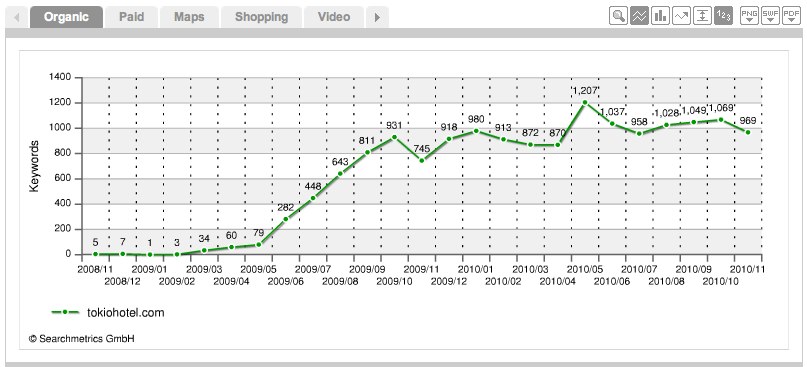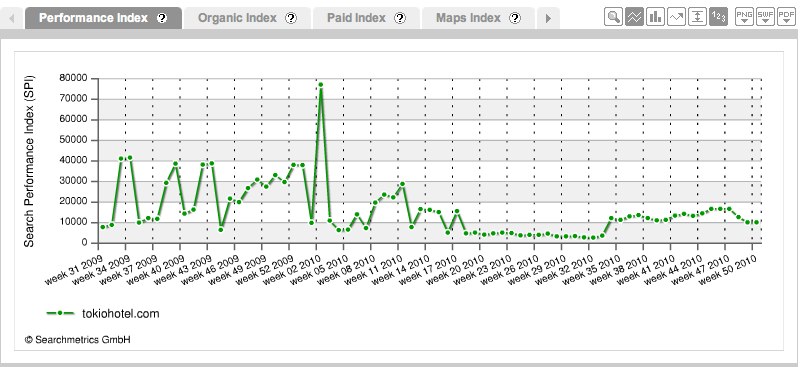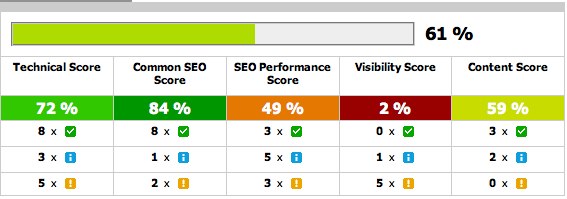When is SEO successful? When a website is first place for a few favorite keywords? If there are generally more visitors to a website? Or is it simply having more money in the register at the end of the month? Presumably, each site operator has their own key indicators with which they measure SEO success.
 But let’s be honest now – does everyone have these kinds of KPIs and figures that are regularly collected and compared over time? Collecting these indicators for a broad discipline like SEO is especially difficult, and many of them are not particularly productive. But that’s the point – to recognize the general goal of a website and then ‘mold’ the achievement of objectives in the form of numbers. And the ‘goal’ doesn’t necessarily have to be money in the register – coverage by the IVW or the content dominance of search results for a particular theme might be more appropriate depending on the situation.
But let’s be honest now – does everyone have these kinds of KPIs and figures that are regularly collected and compared over time? Collecting these indicators for a broad discipline like SEO is especially difficult, and many of them are not particularly productive. But that’s the point – to recognize the general goal of a website and then ‘mold’ the achievement of objectives in the form of numbers. And the ‘goal’ doesn’t necessarily have to be money in the register – coverage by the IVW or the content dominance of search results for a particular theme might be more appropriate depending on the situation.
Because our objectives are so different, I will highlight a few very simple indicators to collect. So everyone can choose the right figures to match their goals.
Somewhat helpful indicators for SEO:
- Der Pagerank is by now completely discredited after an almost six-month long break since its last update. It makes sense as part of some analyses but as an indicator it is not particularly helpful.
- Monitoring individual Keywords is often the focus of website operators. The disappearance of individual search results has caused caused chaos among many an SEO department despite improved traffic and visibility figures. At least with larger websites, the performance of a single keyword should never take center stage.
- And then the figures from Alexa and Compete: It’s true, even these figures can be found in the Searchmetrics Suits. But I consider both of these, for German sites at least, to be questionable and at best only appropriate for a direct comparison of two thematically similar sites.
Helpful indicators for SEO:
- Number of indexed keywords found: This is the indicator mentioned in the Performance Analysis – the appearance of a domain from a query of by now around 24 millions keywords. This is something like an index based visibility measure and says little about how many visitors you can expect. But sometimes, in an area like B2B for example, it’s not about traffic. In this case, this is a particularly valuable indicator.

- Performance Index: Here the estimated values for potential traffic begin to play a part. I have 10,000 indexed keywords but these are only seldom searched for or my site sits in position 99 overall – in this case the Performance Index is almost worthless. If I’m sitting at number one for only a single keyword (‘Tokio Hotel’), however in contrast it alone is performing well. In the Searchmetrics Performance Index, the results for organic searches as well as all those from paid and video searches are included.

- Average position of monitored keywords: The third and most concrete measure of visibility is the average position for monitored keywords in respect to their occurrence in the index. A very concrete and goal oriented value – if the keywords are really appropriate to your objectives.
- Actual traffic for monitored keywords is probably the closest to reality. To this end, the Searchmetrics Suite can be connected with the Omniture Site Catalyst, Google Analytics and now also with eTracker. So using the Suite, traffic figures display the actual visitors incredibly accurately. We can see the effects of simple position changes – and whether you’ve decided on the right keywords.
- Indexed Sites: The more sites you have in the Google index, the better chances you have of being found. Or so the theory goes. There are also cases, in which too many sites can be a problem. But when choosing key indicators we’ll always include this value.
- The Audit Score is a compressed score that brings together individual values from a technical point of view, content depiction and social media visibility.

- Number of backlinks, number of linked domains and IP addresses, link strength: Clearly indirect but nonetheless important is the number of links coming into a site. However, considering the fluctuating quality even a pure figure is very unreliable…
- The Searchmetrics Value Rank (SVR) contains some relevant data and tries to reflect an overall view of a domain. In this area, inbound and outbound links play a roll above all else.
- The Searchmetrics SERPs Value (SSV) allows the comparison of multiple domains according to keyword sets – also on the level of categories. It allows you a quick view of the actual market environment of a website. Assuming the keyword set is appropriate.
Additional indicators for SEO from web analysis:
- Ratio of search engine traffic compared to overall traffic.
- Number of sites with Google traffic.
- Number of keywords (for which visitors arrive)
- SEO users reaching goals (e.g. shopping carts, registrations etc.)
P.S.: Who’s writing this stuff? My name is Eric Kubitz and I am one of the co-founders of CONTENTmanufaktur GmbH Anyone trying to reach me can do so via e-mail (ek@contentmanufaktur.net) or on Twitter. ‘Til next time!